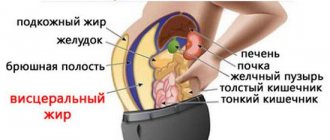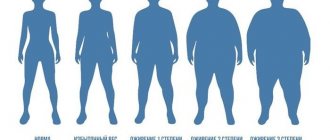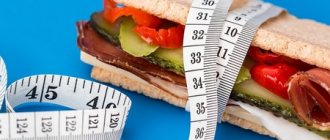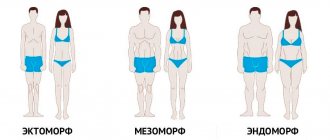Excess weight is excess body weight consisting of fat deposits. There is a concept of weight norms, which will be discussed further. Weight above normal is excessive. A slight excess of the norm indicates a predisposition to obesity and is a reason to change your lifestyle in order to reduce your weight to normal. A significant deviation from the norm is already obesity. The degree of obesity is calculated using special formulas.
The main reason for extra pounds is overeating. Sometimes it is a consequence of metabolic disorders, for example, hypothyroidism or increased prolactin levels. But even in the case of a disease that causes obesity, much depends on nutrition. A person should consume as many calories from food as he needs for the functioning of the body and for everyday physical activity. With a sedentary lifestyle, a person has a minimum of physical activity, so he needs to eat less. If he eats the same as an athlete or manual worker, then the unspent energy consumed from food will be deposited in fat cells.
When discussing the topic of excess weight, it is necessary to talk about the role of metabolism. The volume of fat mass largely depends on the metabolic rate. The faster your metabolism, the more nutrients from food are absorbed and the fewer calories are stored as fat. The intensity of metabolism varies from person to person. But there is one pattern - the older the person, the slower the metabolism. This means that as a person ages, he needs fewer calories to live, and therefore his portions should become smaller. The decrease in metabolic rate is especially noticeable after 40, when age-related changes occur. Weight may begin to increase rapidly. You need to take a closer look at your health and, if necessary, lose those extra pounds.
How body weight affects health
Extra pounds place increased stress on the body. The cardiovascular system, joints, and gastrointestinal tract are primarily affected. Fatty tissue envelops the internal organs, squeezing them and making it difficult to function. As obesity progresses, any number of diseases can develop. Obese people are at risk for diabetes and heart attacks. For women, excess body weight prevents them from getting pregnant.
With obesity, apnea often develops - stopping breathing movements during sleep. Another danger is an increase in lipid levels, which leads to the formation of blood clots. Recently, doctors have proven that obesity provokes the development of bronchial asthma. And this is not the entire list of possible diseases.
The matter is aggravated by psychological problems. Dissatisfaction with your own figure, non-acceptance of your existing image, physical limitations, the development of various diseases, restless sleep - all this leads to depression, apathy or other conditions in which solving the problem of excess weight becomes even more difficult.
Mental health

Psychologists give the following statistics: 20% of people with a normal BMI and more than 75% of those who are overweight periodically suffer from depression. These numbers are not surprising, since the reasons lie on the surface:
- overweight people are always at the mercy of two desires that contradict each other - hunger and the desire to lose weight;
- the blurred figure and sidelong glances of others give rise to internal complexes;
- women associate problems in their personal lives with their weight: he left me because of this, no one looks at me because I’m fat;
- against the background of complexes and worries, eating disorders (bulimia and anorexia) are diagnosed;
- Some good positions choose slender, fit employees, so many career doors for overweight people are closed.
The situation is aggravated by diets that do not give the desired effect, worsen well-being and are dangerous by the formation of new complexes. In adolescents, such mental breakdown can lead to autism and even suicide.
Being depressed only makes the situation worse. Firstly, he begins to eat, and sometimes wash down his melancholy and sadness. Secondly, the level of cortisol jumps, and it is directly involved in the formation of visceral fat.
How quickly can you lose weight without harm to your health?
Proper, safe weight loss is a fairly lengthy process. Experts recommend not using diets with a sharp reduction in calories, but switching to a proper nutrition system and sticking to it constantly. Proper nutrition differs from diets in that with it a person receives all the substances the body needs, but does not overeat and does not consume unhealthy foods, sweet carbonated drinks, or alcohol.
By following the rules of a healthy diet, you can lose weight by reducing calories by about 500 g per week. For some, the process will go even slower - much depends on the individual characteristics of the body. If you want to speed up the process, you need to play sports, after consulting with your doctor. Absolutely healthy people are advised to use intense training in the gym or long runs in the fresh air. In this case, the weight will go away faster - from 1 kg per week. If you have chronic diseases that exclude increased physical activity, you should take up walking, swimming, and physical therapy. At the same time, weight loss occurs more slowly, but there will be no health risks.
It is important to understand that with proper and safe weight loss, body weight decreases slowly but surely. Making the transition to eating healthier can be challenging. Then the new diet system becomes a habit, the person becomes slimmer, more attractive, and much healthier. Physical activity, even not intense, also brings health benefits. And from strict diets that allow you to lose several kilos per week, there is only harm. After them, the body takes a long time to recover, there is a risk of getting diseases of the gastrointestinal tract or other body systems, and the kilos lost after leaving the diet return very quickly.
Obesity symptoms
Constantly increasing body weight is the main symptom of obesity. Due to excess weight, symptoms such as shortness of breath, fatigue, swelling of the lower extremities, increased appetite appear, while patients prefer fatty and heavy foods . Patients may also experience attacks of night hunger and thirst . In women, changes affect the genital area, the menstrual cycle is disrupted, signs of hirsutism , and in men, potency . Hyperpigmentation of the skin may also occur, especially on the arms and elbows, as well as the appearance of small stretch marks ( striae ) on the neck, thighs and abdomen.
These symptoms of obesity appear long before excess weight begins to interfere with the normal rhythm of life, so many patients do not consider their weight to be overweight. In the first stages of the disease, a person’s weight increases up to 20% and gradually increases. An equally important sign of the disease is hypertension . Cholesterol tends to settle on the walls of blood vessels, thereby impeding blood flow.
Fat deposits can be distributed evenly, and a person does not pay attention to the appearance of excess weight for a long time. When accumulation occurs in certain places, signs of obesity are more noticeable. In children, this localized obesity leads to stunted growth.
Obesity in children most often develops due to acquired metabolic disorders, as well as heredity. Typically, obesity can be observed at 1 year, and at 10-15 years. In children 10-15 years old, the cause of obesity is usually hypothalamic syndrome , which is characterized by the appearance of stretch marks on the hips, buttocks, and mammary glands. An increase in blood pressure is observed, and an increase in intracranial pressure is also possible.
What you need to know about metabolism for weight loss
The metabolic process is extremely important for losing weight. The more intense the metabolism, the faster calories are burned, and the more effectively a person loses weight. There are ways to speed up your metabolism. To increase the speed of metabolic processes, you need to give up junk food, switch to proper nutrition, eat often in small portions, eat more vegetables and fruits, drink plenty of fluids, and exercise regularly.
To increase metabolism, special pharmaceutical drugs are used, but it is better not to take them without a doctor’s recommendation. Instead, you should add foods that speed up your metabolism to your diet:
- Apple vinegar;
- Coconut oil;
- garlic;
- hot spices;
- cinnamon;
- ginger;
- apples;
- citrus;
- seafood;
- whole grains.
Video: Excess weight - how to deal with overeating? Mikhail Labkovsky, psychologist
Read on topic:
- 20 reasons to lose weight: why is obesity dangerous?
- Diet table No. 8 for weight loss
- Encoding for excess weight: methods
- 5 myths that contribute to the development of excess weight
- Eating every other day: rebooting your metabolism
How to calculate your ideal weight
There are special online calculators to calculate your ideal weight. To get the result, you need to enter some data in the appropriate fields - age, weight, gender. Using a calculator, you can calculate whether your current weight falls within the normal range and how much it differs from the ideal. If you already have obesity, the calculator will show what degree it is.
Constitution type
When calculating your ideal weight, you need to take into account your body type. There are usually three types. The first is asthenic. This includes people with thin bones. Their ideal weight is closer to the lower limit of normal. At this weight they feel most comfortable and look good. The second type is normosthenics. These are people with an average build. The third type is hypersthenics. Their weight norm is at the upper limit of normal. If a hypersthenic person weighs the same as an asthenic person of the same height, then he looks exhausted, and his weight is considered insufficient.
Constitution type is important to consider when setting weight loss goals. To determine your type, you need to measure your wrist circumference. For women, the standards are as follows: girth less than 15 cm - asthenic; from 15 to 17 cm - normosthenic; more than 17 cm - hypersthenic.
Ideal weight
Ideal weight is an average standard calculated based on data - height, weight, age. There are various methods for calculating weight norms and ideal weight. Results may vary slightly. To find your individual ideal weight, it is better to focus not on specific numbers, but on the normal range and your feelings. If your weight is within the normal range, and you feel good, then you shouldn’t specifically lose weight or gain weight.
What weight is considered overweight?
What weight can be considered overweight – 60, 80, 100 kg? Is there some universal formula for determining normal weight? Yes, there is such a formula.
The presence of excess weight can be determined using Quetelet’s formula: BMI = Weight/Height2 [kg/m2]. A BMI greater than 25 indicates overweight.
Quetelet's formula is the main guideline in diagnosing excess weight. Please note that a BMI that is slightly higher than normal does not warrant a diagnosis of obesity. But if accompanying symptoms arise (extra pounds make it difficult to tolerate physical activity, the functions of internal organs and skin are disrupted, stomach upsets, constipation, thirst, shortness of breath appear, joints hurt), then it’s time to seek help from specialists in the field of nutrition.
Overweight and obesity are different concepts. With obesity, a thick layer of fat accumulates under the skin. Fat forms in the chest, abdomen, thighs and buttocks, covers the heart, blood vessels and liver, causing organ dysfunction and chronic diseases.
The symptoms and degree of obesity can be determined by the thickness of the fat fold under the skin of the abdomen. For men, the norm is 1-2 cm, for women – 2-4 cm. A fold thickness of 5-10 cm indicates symptoms of obesity.
- We recommend reading: obesity in men and women
Quetelet's formula gives only a general idea of weight standards and does not take into account age and body type. Therefore, it is not suitable for diagnosing children and athletes.
How to make a diet
The habit of eating right does not develop immediately. After switching to PN, for the first time you need to create a diet, think through each meal, calculate calories and nutrients.
How to calculate BZHU
A nutritious diet should be based on the optimal combination of proteins, fats, and carbohydrates. To calculate BZHU, there are online calculators that help select the ratio of nutrients taking into account gender, age, weight and height, as well as a person’s goals - to maintain health, lose weight or gain weight.
There are various systems for calculating the ratio of BJU. According to one of the most common, with a healthy diet, a person should have 30% proteins, the same amount of fats and 40% carbohydrates in their diet. To lose weight, you need to reduce the proportion of fat consumed, but increase the amount of carbohydrates.
Number of proteins
The amount of protein in the diet is calculated taking into account physical activity and weight. People leading an active lifestyle require at least 1.5 g of protein per kilogram of weight daily. The daily protein requirement for people with a sedentary lifestyle is much less - about 0.8 g per kilogram of weight. A specialist will help you calculate more accurately.
Fat to Carbohydrate Ratio
There should be a minimum of fat in the menu of a person losing weight - up to 20%. You won’t be able to do without them at all, since fats are needed for the full functioning of the body and the normal metabolic process. There should be much more carbohydrates - up to 65%. A nutritionist will help you calculate everything correctly.
Fighting excess weight
The fight against excess weight is, first of all, an internal confrontation between willpower and excessive appetite and laziness. The latter factors win out more often, which is why few people manage to get closer to their cherished ideal weight.
If your decision to lose weight is rock solid, you are ready to believe in the power of healthy eating and adjust your diet, stop sitting on the couch and start doing a daily set of weight loss exercises - you can win over excess weight!!!
Help from a nutritionist
Consulting a nutritionist is a necessary step on the path to weight loss. Each body is unique, so there is no single prevention that can help everyone. By contacting a nutritionist, you will receive comprehensive information about your body and find out which weight loss strategy will suit your body. The specialist will explain in detail the basic rules for losing weight that you will have to follow throughout your life.
- Not to starve! The diet only needs to be slightly adjusted: reduce the single serving, replace harmful foods with healthy analogues. Strict diets, instead of losing weight, have the opposite effect. Feeling prolonged hunger, the body decides that extreme times have come and it urgently needs to stock up on fat.
- Eat little and often! Nutritionists recommend eating your daily diet in 5 meals: breakfast, second breakfast, lunch, afternoon snack, dinner. When you feel the urge to grab a quick snack, choose fruits, vegetables, and dairy products. You should not eat before going to bed.
- Maintain a balance of nutrients! Balance your diet so that you eat 30% protein, 20% fat and 50% carbohydrates per day.
- Burn more calories than you eat! Therefore, the more you eat at lunch, the more physical activity you need to burn off the calories. Conclusion: either eat in moderation, or sweat in the gym sparing no effort.
- Drink water! A glass of water, drunk half an hour before meals, will dull hunger and the desire to devour all the dishes that are on the table. In addition, water is a universal solvent and is necessary for digestion.
Help from a psychologist
Normal eating behavior is the best therapy for excess weight. Keep track of what you think about, do and feel while eating, write down your observations in your diary. The recordings will help you understand what behaviors need to be changed.
- Eat mindfully! Listen to your inner feelings, try to eat to satisfy your hunger, and do not “eat” stress and emotional tension.
- Turn off the TV! You need to eat at the table, looking at the plate, thinking about the benefits that the food you eat will bring. Break the association between eating and watching TV, reading, and talking.
- Distinguish between hunger and emotions! Find out what emotion makes you feel hungry? Fear, boredom, sadness, fatigue? If you are drawn to the refrigerator by emotion rather than hunger, find other ways to satisfy your emotional needs.
- Learn to think sensibly! A negative attitude towards healthy eating makes dieting a punishment for those losing weight. Learn to overcome negative attitudes and encourage healthy eating habits, otherwise therapy will not be effective.
- Choose an active rhythm! Use fitness bracelets for weight loss, to track your activity level and track calories burned per day. This way you will quickly learn self-control and make sure that you have chosen the right path.
THESE ARTICLES WILL HELP YOU LOSE WEIGHT
Your feedback on the article:
( 816 ratings, average: 4.48 out of 5)
How to train properly

The main condition for training is regularity. You need to choose the type of training and its frequency with a specialist, especially if you have health problems. The second important condition is that the chosen training option matches personal capabilities and preferences. For example, if a person is advised to exercise in the pool, but he does not like to swim or it is too far for him to get to the sports complex, he can replace it with an alternative form of physical activity - walking or home gymnastics.
Why do you need training?
Exercise is necessary to burn stored fat. However, even after a person has lost weight and adjusted his diet so that he consumes exactly as many calories as he burns, he is not recommended to quit training. The fact is that the body needs to be kept in good shape all the time; this is useful for the general condition of the body and for the figure.
How to exercise to lose weight
Any physical exercise helps you lose weight. The choice must be individual.
At what intensity to train?
The more intense the workout, the faster the excess weight comes off. But in this matter, as in everything, you need to know when to stop. For any chronic diseases, you should consult your doctor before starting training. In any case, you need to start with a minimum load, and only over time increase it to the maximum possible.
How many times a week to train
Complex training should be done first 2 times a week, then 3. Sometimes the number of workouts is increased and done daily. If running or walking is chosen as physical activity, this should be done as daily as possible. Light gentle exercises for people with severe obesity are also recommended to be done daily.
Causes of excess weight
Doctors are confident that the main causes of obesity are associated with genetic and endocrine disorders and heredity. Nutritionists respond by stating that an innate predisposition to excess weight will not manifest itself if a person is taught to lead a healthy lifestyle and eat right from childhood. Psychologists say that excess weight is a consequence of stress and dislike for one’s own body.
All three theories about the reasons for the appearance of extra pounds on the body are correct and complement each other. Therefore, the problem of excess weight requires an integrated approach to diagnosis and therapy.
Physiological
The main physiological causes of excess weight are associated with metabolic disorders. In the body of a person prone to obesity, the process of processing food into energy occurs very slowly, and unprocessed substances are deposited in the subcutaneous fat layer. To restore metabolism, you need to identify and eliminate the causes of the disorder.

Genetic predisposition
Scientists have discovered a number of genes in human DNA that create an innate predisposition to obesity. If both parents are diagnosed with obesity, the likelihood of developing a similar pathology in the child increases to 66%, that is, two out of three children are overweight. If only one parent shows a tendency to be overweight, children will be overweight in 50% of cases. If both parents are of normal weight, the likelihood of obesity in the offspring is reduced to 9%.
Endocrine disorders
Diseases of the endocrine system, such as hypothyroidism and Cushing's syndrome, cause problems with excess weight.
With hypothyroidism, the function of the thyroid gland decreases, which leads to a slow metabolism. A person’s body temperature decreases, heartbeat and breathing slow down. To maintain vital functions, fewer calories are required, and extra pounds gradually accumulate. To diagnose hypothyroidism, it is recommended to take a test for the level of thyroid-stimulating hormone.
In Cushing's syndrome, fat accumulation is typical in the abdomen and buttocks. The disease is accompanied by other symptoms: high blood pressure, menstrual cycle disruption, and increased blood sugar levels. Symptoms of Cushing's differ from signs of obesity: purple stretch marks appear, the skin atrophies, and potassium in the blood decreases.
Pregnancy
Hormonal changes occur in the body of a pregnant woman, which lead to cumulative processes. Metabolic changes are normal for pregnant women. A woman becomes the main source of nutrition for a child during fetal development and breastfeeding, so the accumulation of fat reserves continues after pregnancy.
The desire to lose excess weight after childbirth, to regain a slim figure and the attention of men are the main reasons for women’s interest in diets and other weight loss methods.
Age
It has been observed that as people age, they quickly gain weight and have difficulty losing weight. The reasons lie in the aging process of the body: motor activity decreases, metabolism occurs slowly, the body requires less energy, and therefore burns fewer calories.
Lifestyle
It is not surprising that modern lifestyle leads to weight problems. Gone are the days of physical labor and natural food grown in the garden. The age of technology and fast food has arrived.
Technological advances have reduced the need for physical labor from 95% to 5%. And eating has evolved from a natural process of satisfying hunger into a symbolic tradition. People eat for company, on the occasion of a holiday, chew out of boredom, or “seize up” problems with sweets.
Eating disorders are a risk factor that leads to obesity.
Social environment
The expectations and traditions of the social group that surrounds a person may unintentionally cause excess weight. Shared meals are an important part of people’s communication, a traditional ritual that cements relationships. Every family and group has certain “gastronomic” preferences.

If a participant decides to ignore traditions, he will certainly encounter condemnation and resistance from others. By changing eating behavior, the participant unwittingly forces others to adjust their diet, which they clearly did not plan.
Lack of understanding and support from family and friends makes it difficult to achieve the goal, and sometimes stops a person halfway to losing excess weight.
Eating habits
The harm of eating habits imposed by the Western lifestyle is known to people, but changing habitual behavior is not so easy. It seems that the crazy pace of life, busy work schedule, bustle and stressful situations should contribute to weight loss. As a result, another risk factor for the development of obesity arises. Pay attention to the list of habits that do not bring anything good to people, but harm the body and figure.
- People have forgotten how to have breakfast. Breakfast is the main source of energy. In the morning, a person should consume at least 400 kilocalories to feel normal. If you didn’t have breakfast in the morning, you eat on the go, quickly and a lot, or you eat up for the whole day with a hearty dinner.
- They eat poor quality food. Delicacies, sweets, smoked meats, fast food - food rich in flavors, carbohydrates, calories. Nutrients – zero, one harm to the body. A lack of fruits, vegetables and fiber interferes with the synthesis of good cholesterol and the elimination of bad cholesterol.
- Eat in large portions. Nutritionists recommend placing a portion on a plate that fits in two palms. People are able to eat 2-3-4 times more food, but the body will absorb and process only the first portion into energy, and subcutaneous fat is formed from excess food.
- They eat and watch TV. While eating, you need to look at the food, and listen to your own stomach in order to receive a signal from the body in time: “I’m full”! TV occupies the brain with unnecessary information, so there is no control over the saturation process. And a conditioned reflex is developed: the TV turned on - your mouth waters, you urgently need to make a sandwich.
- They chew gum. Chewing gum contains carbohydrates; in addition, chewing gum on an empty stomach provokes gastritis and other gastrointestinal diseases. As a result, digestion and metabolism are disrupted.
- They forget to drink water. Water is an essential solvent for digestion. You need to drink two liters of clean water at room temperature per day. Not tea, not soda, not juices - just plain water.

Lack of physical activity
The era of a sedentary lifestyle has arrived for humans. We work while sitting, drive while sitting, eat while sitting, watch TV or sit at the computer while sitting, sit with friends in a cafe... Lack of physical activity is the main risk factor for overweight and obesity. Being active and athletic is good for both your appearance and the health of your entire body.
A person needs healthy physical activity, at least 60 minutes of daily exercise: running, jumping rope, swimming, regular morning exercises.
Sleep problems
Chronic sleep problems lead to exhaustion of the body. A person who has not had enough sleep feels lethargic and is not ready for vigorous activity. Instinctively, the body looks for a source of additional energy and finds it in food. In addition, fatigue reduces the level of protein, which is responsible for regulating appetite, and metabolism slows down. No matter how much a person eats, the energy reserves in the body will not be replenished. Calories burn slowly, and the feeling of hunger continues to torment you.
Psychological
People who are in a state of chronic emotional stress strive to drown out internal discomfort by any means. Having not found support among loved ones, many find solace in food.
Stress
Stressful situations increase the level of hormones in the human body. In order to protect against an aggressive external environment, hormones are produced: cortisol (responsible for preserving energy resources) and cortisone (causes the accumulation of fat reserves). The fight against stress begins.
To get rid of a stressful state, a person needs to use an active strategy: find and eliminate the cause of the situation. But more often the struggle takes place in a passive form, the body tries to eliminate the consequences, and not the cause of the situation.

People who are prone to obesity choose passive strategies to deal with stress - instead of looking for solutions, they “eat up problems.”
Psychotherapists have noticed that symptoms of central obesity in women (when excess abdominal fat accumulates on the abdomen) indicate dissatisfaction with life. A thick fat pad is formed in the solar plexus area - the energy center for protection from the outside world. The more a woman is dissatisfied with herself and her life, the more fat forms on her stomach.
Alexithymia
With alexithymia, a person cannot distinguish between emotions and does not recognize the difference between feelings of fear and anxiety, sadness and anger. Feeling nervous tension, boredom, disappointment, people experience emotional hunger, but mistake it for physical hunger. As a result, every emotional outburst is accompanied by a hearty snack.
Sexual problems
Lack of regular sex life leads to a lack of the good hormone oxytocin. Oxytocin, the “calm hormone,” is also released when eating foods rich in fat. Therefore, single people compensate for the lack of sex by eating fatty foods.
Excess body weight may be associated with negative sexual experiences in the past.
People who have experienced sexual violence experience anxiety and fear at the thought of intimate relationships, and unconsciously strive to gain weight. Excess weight helps them get rid of attractive forms, hide their natural sexuality, and avoid repeating unpleasant experiences.
Many women gain weight after marriage. Psychologists say that slender beauties who have found family happiness turn into plump women due to the loss of the need to seduce and attract men. A married woman has no one to show off her figure except her own husband. And the husband supposedly loves his wife “in any form”...
Homework: After familiarizing yourself with the mechanisms of excess weight accumulation, make a list of risk factors that lead to the accumulation of fat in your body or prevent you from losing weight. Using the list, find solutions that will help you eliminate the causes and develop a weight loss strategy.

Diets
Weight loss specialists are, in principle, against any diets. Instead, it is recommended to switch to PP. But in some cases, light diets are allowed. They are used to immediately lose a certain amount of extra kilos, so that later with the help of PP they can maintain the result.
In some cases, the process of losing weight may stop, despite the fact that all the rules of nutrition and physical activity are followed. In such cases, light diets or fasting days are used to “stimulate” metabolism. As soon as the weight begins to decrease at the desired speed, it is better to abandon such methods.
Determining whether you are overweight
The quickest and easiest way to determine whether you are overweight is based on your Body Mass Index. In order to calculate this individual indicator, it is enough to divide your weight in kilograms by your height in centimeters squared. Check the resulting figure with the table below to understand whether you have problems with weight and what scale they are.
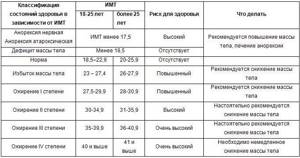
Don't miss interesting news and events in the telegram channel: https://tlgg.ru/fitbarnews
Folk remedies
When using folk remedies for weight loss, you need to take into account that their effectiveness has not been scientifically proven, and they work only as part of an integral system, including diet correction, increased physical activity, and the development of motivation.
All folk remedies can be divided into several categories:
- procedures using thermal effects (baths, saunas, wraps, baths, hydromassage with a shower);
- decoctions and drinks with a cleansing effect (tinctures of linden, cherry leaves, buckthorn bark, oatmeal jelly, ginger tea);
- diuretics and laxatives (dried fruit mixtures, prune salad with kiwi, melon, infusions of chamomile, parsley, dill, green tea);
- diets using one or several products with a cleansing effect.
Taking medications
Today, pharmacies sell many weight loss drugs. They affect differently and are divided into:
- reducing appetite;
- blocking the absorption of carbohydrates;
- with a diuretic or laxative effect;
- accelerating metabolism;
- removing waste and toxins.
Some drugs have a proven effect, others are biological additives without a proven effect. It is not recommended to select and use the products yourself. This should be done together with a weight loss specialist.

